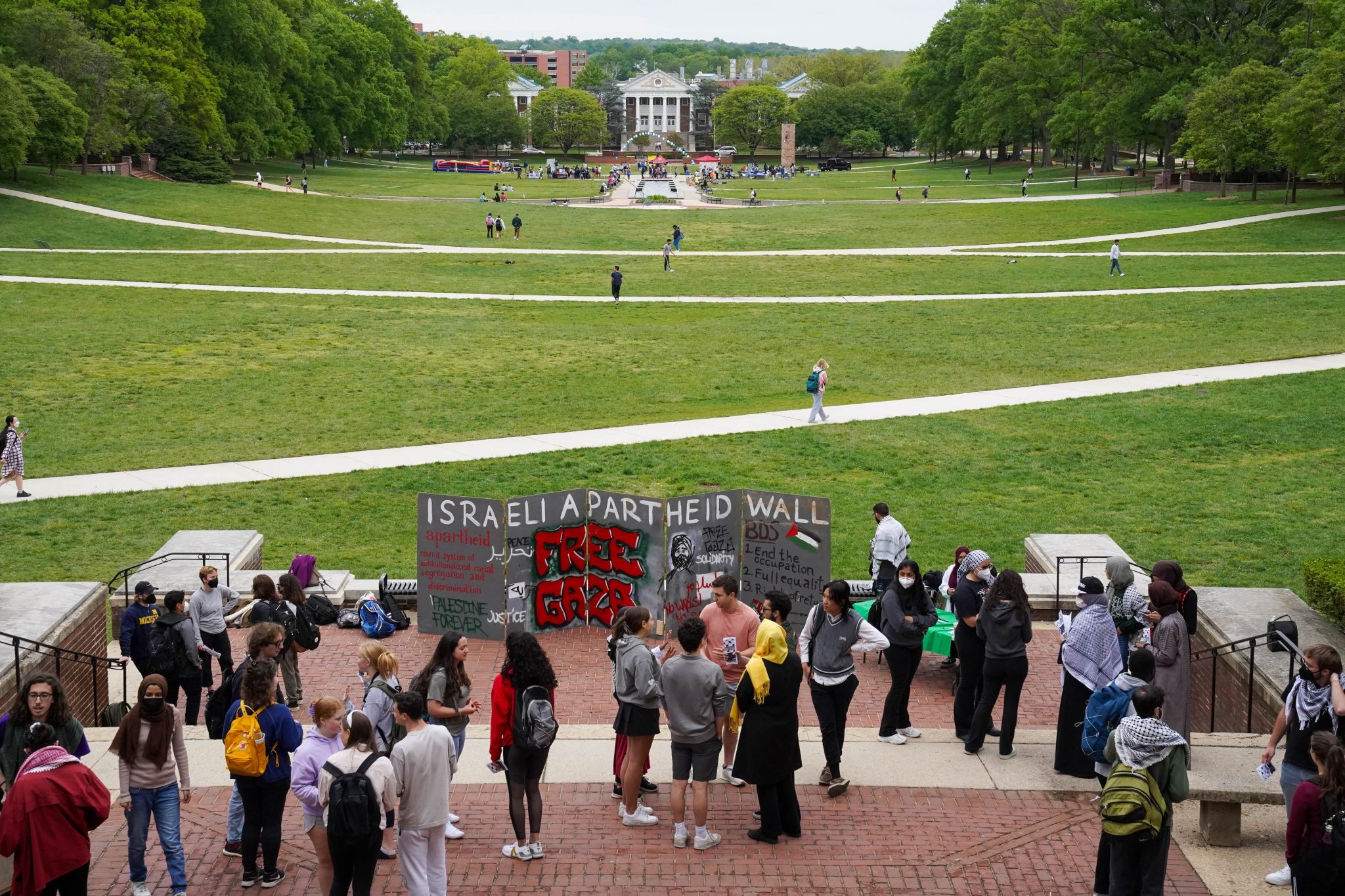Views expressed in opinion columns are the author’s own.
Walking around this week, the campus’ tolerance for silencing the Palestinian movement has been painfully obvious. Remnants of red “Boycott Israel Fest” stickers, seemingly ripped off, remain in tatters as proof of another story of forcibly erased Palestinian voices at this university.
Seeing these reminded me of statements released on both SGA parties’ Instagram pages which strongly condemned historic efforts by Palestinian activists on campus — to pass a Boycott, Sanctions and Divestment bill through the SGA — by equating these anti-Zionist efforts with antisemitism.
The conflation of anti-Zionist efforts with antisemitism perpetuates harmful stigmas that silence Palestinian activists and their pursuit of liberation. These acts that suppress our right to free speech have shown that this university needs to ensure a differentiation between acts of anti-Zionism and antisemitism, and that Palestinian activists on campus can practice protected speech.
Myths consolidating the two diminish the visceral reaction we all ought to have against antisemitism. This university must guarantee that legitimate criticisms of Israeli human rights abuses and anti-Zionist advocacy aren’t used to advance antisemitism. Redirecting the point of anti-Zionism from critiquing a political ideology and government to an issue of race villainizes the movement’s narratives.
There is a difference between a pernicious, racist belief that targets people in a minority population and an anti-government ideology. Combining the two means that evils committed by the government are associated with people who largely have no say in those actions. In fact, doing so contributes to stigmas against Judaism.
The BDS movement targets the political ideology that sets up a settler-colonial state established on the occupation, erasure, forced removal and murders of indigenous Palestinians. It is these human rights abuses that anti-Zionism is based upon. Anti-Zionism is a human rights movement, a criticism of the Israeli government that is committed to the very violation of those rights.
Just as we must condemn abuses against Jewish people, we must stand against the violation of Palestinian existence. That is the humanity we ask for.
Numerous human rights organizations, including Amnesty International and Human Rights Watch, have outlined findings that the treatment of Palestinans in Israeli-occupied territories is a crime of apartheid. In fact, a member of this university’s own faculty has recently published surveys indicating Middle East scholars agree.
References to apartheid lend strong connections to South African history. The Palestinian BDS movement is modeled after the anti-apartheid movement. In 2017, students on this campus advocating for a BDS bill saw statements of solidarity come from South African leaders including Nelson Mandela’s grandson.
Our SGA has no place to shut down criticisms against this, and by calling these opinions antisemitic, the very association meant to promote student voices preemptively silences those who are passionate about Palestinian liberation.
SGA candidates should not be using antisemitism – a centuries old form of discrimination Jewish people face globally – as a weapon to mute another group that is subject to discrimination.
This misinformation gives Zionist voices at this university control over the mainstream narrative. The fight to reclaim this narrative by educating the campus about what Zionism is in practice motivates events such as Tuesday’s Boycott of Israel Fest.
This university and our SGA has continually failed to show its tolerance, let alone support, for those students protesting Tuesday. A significant portion of protestors’ efforts at this year’s boycott was handing out educational pamphlets on the Israeli occupation of Palestine as part of an annual tradition of calling out the human rights abuses and ethnic cleansing enabled by Zionism. By standing against the Palestinian movement’s efforts, our SGA has emboldened those who aim to repress these activists.
This university needs to take a stand on students’ right to protest, especially on topics that involve liberation from serious human rights violations. After the Instagram anti-BDS statements, our university’s administration has an obligation to hold these SGA parties accountable for efforts to stifle a student movement. This university must keep our SGA in check and ensure that no student voices are left unheard.
This must be done through either releasing a statement or by creating a set of guidelines that clearly distinguishes anti-Zionism from antisemitism. These need to be done with the collaboration of Palestinian activists breaking down what anti-Zionism truly is and clarify that SGA does not have the ability to silence the anti-Zionist movement – or any good-faith student movement, for that matter.
It’s unacceptable that this university hasn’t taken action to protect students speaking up against Zionism. Palestinian activists are fighting for liberation, and they must have the room to do so without being met with misinformed accusations of antisemitism. Calling out global human rights violations cannot be shut down. It must be a priority for both our SGA and our administration to protect and support them.
Perhaps one day, when Palestinian liberation activists are deemed worthy of a voice, the only hindrance to their protests will come from the weather, and not our student government trying to silence their concerns.
Imaan Shikoh is a sophomore public policy major. She can be reached at ishikoh@terpmail.umd.edu.



